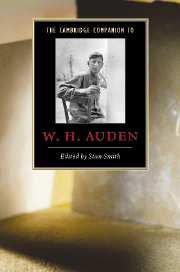Book contents
- Frontmatter
- 1 Introduction
- 2 Auden's life and character
- 3 Auden's England
- 4 Auden in America
- 5 The European Auden
- 6 Auden's travel writings
- 7 Auden's plays and dramatic writings
- 8 Auden's light and serio-comic verse
- 9 Auden's prose
- 10 Auden's English
- 11 Auden and modern theory
- 12 Auden's politics
- 13 Auden, psychology and society
- 14 Auden
- 15 Auden and religion
- 16 Auden's landscapes
- 17 Auden and ecology
- 18 Auden and influence
- 19 Bibliographic essay and review of Auden studies
- Index
4 - Auden in America
Published online by Cambridge University Press: 28 May 2006
- Frontmatter
- 1 Introduction
- 2 Auden's life and character
- 3 Auden's England
- 4 Auden in America
- 5 The European Auden
- 6 Auden's travel writings
- 7 Auden's plays and dramatic writings
- 8 Auden's light and serio-comic verse
- 9 Auden's prose
- 10 Auden's English
- 11 Auden and modern theory
- 12 Auden's politics
- 13 Auden, psychology and society
- 14 Auden
- 15 Auden and religion
- 16 Auden's landscapes
- 17 Auden and ecology
- 18 Auden and influence
- 19 Bibliographic essay and review of Auden studies
- Index
Summary
The classical route map for a great poet's career was linear and ascendant. Following the Virgilian example, it began with pastoral apprenticeship (The Eclogues), continued with works about subjects of greater significance in more complex forms (The Georgics) and ended with the loftiest achievement, a national epic (The Aeneid). By this standard almost all twentieth-century artistic lives, marked by lateral turns and ideological reversals, seem flawed beyond mending. But classicism's failings have become modernity's virtues, and, understood in this light, W. H. Auden's career, with its sudden departures, intense foreswearings and radical changes of direction, is prototypically unpredictable, prototypically modern.
It is ‘my vocation to be aWandering Jew’, Auden, aware of this emblematic restlessness, told friends. Of his many ‘moves’, the most fateful was his decision to leave England at the height of his early celebrity, to live in the United States and, before long, become an American citizen. It was also easily the most controversial.
On a freezing January morning in 1939, Auden and Isherwood came ashore in Manhattan, apparently intending to stay for a year and write a travel book about the States, to be titled Address Not Known. Auden was beginning his challenge, at first perhaps unintended but later certainly deliberate, to one of the most tenaciously held assumptions of post-Romantic culture, one so deeply embedded in current ways of imagining literary history that many critics hardly acknowledge its existence, let alone question its explanatory power.
- Type
- Chapter
- Information
- The Cambridge Companion to W. H. Auden , pp. 39 - 54Publisher: Cambridge University PressPrint publication year: 2005
- 2
- Cited by

